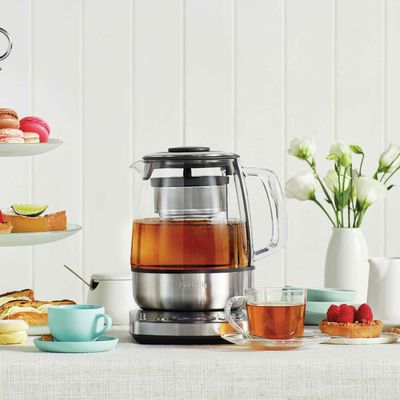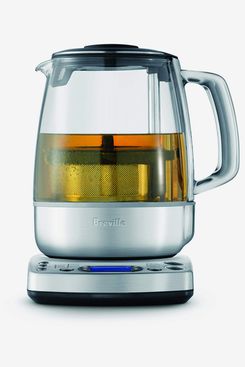
Hot take: Tea drinkers in the United States are disenfranchised by a mercantile preference toward coffee drinkers. I’ve put up with this inequity since I started regularly drinking tea in high school, and now, after many years of paying $6 for a Lipton tea bag to be removed from a paper pouch and dropped into a four-ounce cup of tepid water, I show up to restaurants with a smuggled thermos of genmaicha to match my meal.
For the coffee-blinded, tea is like water, but better. It’s caffeinated, flavorful, good for you, doesn’t cause bad breath, and only kind of stains your teeth. I imagine its invention in ancient China topped kombucha, cold brew, drinkable yogurt, and Four Loko (RIP) combined. But the tea on tea is that it’s a $50 billion global industry that hasn’t changed much since. I began my tea-drinking habit by steeping tea bags inside large plastic takeout containers filled with tap water in the microwave (which in tea-speak is called “rock bottom”), before upgrading to anthropomorphic tea infusers seemingly created just for the pun of it (Octeapus, Manatea), before being gifted a Bodum teapot. But those all didn’t make making tea any easier. Yes, there are electric kettles, but many don’t do much else besides boil water better. Some, like electric kettles from Viante and Hamilton Beach and even Mr. Coffee (in an apparent existential crisis), boast built-in infusers, but those still require you to remove the infuser from the water at the correct time. Simply put: These slight upgrades in no way push the science of brewing that perfect cup. Meanwhile, coffee’s already voice-activated.
While it may not be that smart, Breville’s Tea Maker is perhaps the most artificially intelligent machine a tea enthusiast can buy to brew at home, a conclusion I reached after researching top-of-the-line models for weeks. It brews tea at custom temperatures depending on leaf type and flavor strength, but what differentiates this from less-expensive alternatives is something that almost all run-of-the-mill coffee makers do: It brews automatically, at any time of day, without you having to do anything but pour in the tea. The Breville’s pièce de résistance is a metal-mesh basket that robotically dunks loose leaves in boiled water for the exact steeping time and then removes them, resting above the water’s surface to prevent too-bitter brews or totally weak souse. Shockingly, this is groundbreaking — I’ve yet to see a product take over this manual step. You neither have to be present nor sentient for tea to happen.
Like other forms of revolutionary science — CRISPR, machine learning, driverless cars — there remain some functional issues with the Tea Maker. It piercingly beeps thrice upon completion. Over time, the tannins from sitting tea stain everything within, though Breville claims this improves subsequent cups’ flavor profiles. It only keeps what’s brewed to temperature for 60 minutes, so you have to reheat the pot in hourly increments. And then there’s the price. While disposable income can be in short supply in New York (and elsewhere), in my opinion, the serious tea drinker would be wise to give up some for the Breville. According to one study, the average American spends $1,100 a year on coffee; with this machine, we now have an opportunity to splurge, too.
I can also confirm that with your purchase you’ll get wonderful customer service (Breville helped me even after I accidentally short-circuited the jug by leaving it in a wet sink) and a warranty that covers product damage for a year. And, of course, the witchy fine-tuning of your favorite twig tea, at the perfect temperature, for one whole hour — a feat we tea-drinkers have waited so long for. Who cares if it takes another century to invent the thing that keeps it warm for two.
The Strategist is designed to surface the most useful, expert recommendations for things to buy across the vast e-commerce landscape. Some of our latest conquests include the best acne treatments, rolling luggage, pillows for side sleepers, natural anxiety remedies, and bath towels. We update links when possible, but note that deals can expire and all prices are subject to change.






